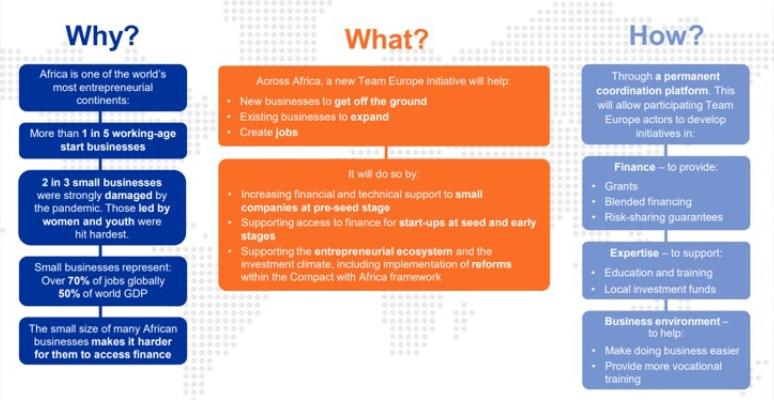
The Digital Logistics Award
September 28, 2021
DIGILOGIC DIHs Peer Learning Programme
October 6, 2021Dr Stephen Fox, Principal Scientist at VTT Technical Research Centre of Finland, presents DIGILOGIC at the Fourth Annual Southern Africa Innovation Forum (ASAIF 2021)
The online panel “Support Instruments for Expanding into New Markets” took place on 23rd September, 2021 and was moderated by Dr Budzanani Tacheba, Director of Innovation and Technology, Botswana Innovation Hub, Botswana.
With the participation of Mr Innocent Mallya, General Manager at Seedstars Tanzania, Seedstars Investment Readiness Programme SAIS 2 Project, Tanzania and Ms Lerato Mduli, Partner Projects Lead & Executive Director at Catalyst for Growth, Testing the C4G Ecosystem Analytics Platform in SADC SAIS 2 Project, South Africa.
Here below an abstract of Dr Stephen Fox's presentation and here the video recording..
Individual European Countries
European countries in DIGILOGIC H2020 project are Finland, Germany, and Italy. Each country has its own organizations for supporting expansion into new markets. For example, Finland has Finnpartnership, which facilitate contacts to companies in developing markets looking for Finnish partners. Finnpartnership provides information about doing business in different countries. It provides a matchmaking service, and business partnership support grants. Germany has GIZ, which is active in international cooperation for sustainable development and international education work. It has more than 50 years of experience including in economic development, employment promotion, and sustainable energy. Italy has AICS (Italian Agency for Development Cooperation), which is active in, for example, economic development, food security, fragile states, and rural development.
EU Directorate-General for International Partnerships
In addition to organizations from individual European countries, EU countries join together in The Directorate-General for International Partnerships, which aims to build international partnerships for sustainable global change. The EU dedicates about 10 percent of its budget to external action in form of grants, contracts, and budget support to partner countries including more than 40 African countries. Initiative include, for example, the Digital for Development (D4D) Hub that aligns EU digital initiatives for an increased impact. The strategic multi-stakeholder platform promotes new international partnerships on digital transformation between the European Union and partner countries in Africa. The joint mission is a human-centric approach to digital transformation: Facilitating multi-stakeholder dialogues, sharing digital expertise and fostering investments of diverse European and global partners. This is based on the understand that only if we join forces through digital cooperation, we can take on this global challenge and untap digital opportunities.
Africa-Europe Alliance
In particular, the Africa-Europe Alliance aims for a coherent economic strategy for EU-Africa relations. The Alliance defines job creation as the key target with African and European investments as the main vehicle, focusing on areas with the greatest potential for jobs and added-value creation. The Alliance aims to strengthening business environment and investment climate; to investing in people by investing in education and skills; to tap into the full potential of economic integration and trade; boost strategic investment and strengthening the role of the private sector to create jobs.
Africa-Europe Innovation Partnership
With regards to Digital Innovation Hubs, the Africa-Europe Innovation Partnership (AEIP) aims to connect high-quality tech hubs from both continents to explore opportunities for mutually beneficial partnerships resulting in collaboration, exchange and growth. The Africa-Europe Innovation Partnership aims to support and connect innovation and technology incubators and accelerators in tapping into new markets, find their trusted partner across the Mediterranean as well as build new perspectives, knowledge and networks. Incubators, accelerators and technology transfer offices play a key role in fostering development of innovative enterprises. They allow start-ups and SMEs to engage in (new) business opportunities by providing support, guidance, mentorships and coaching, as well as access to essential network contacts. To harness the benefits of disruptive innovation and technology, the Africa-Europe Innovation Partnership seeks to build mutually beneficial partnerships and networks between the two continents by addressing both issues faced by entrepreneurs pursuing growth internationally and challenges in harnessing funding opportunities. This initiative may come to a conclusion quite soon but new initiatives are coming such as Team Europe which is focused on entrepreneurship, and recognizes that Africa is one of the world’s most entrepreneurship with more than one in five working-age persons starting their own businesses. Also, there are ongoing “soft–landing” programmes. These enable European and African SMEs and start-ups dive deep into new markets and ecosystems to support their adaptation and growth internationally. The aim is holistic programmes that provide a one-stop-shops for business support services including access to the local business networks, meeting potential investors, tailored trainings, and support in obtaining visas.

Horizon Programme
EU-Africa initiatives are increasingly apparent in the EU’s established funding programmes. For example, the work programme of Horizon Europe for 2021-2022 includes targeted actions the first ever ambitious and comprehensive 'Africa Initiative”. Through which the EU seeks to enhance cooperation with Africa to promote actions targeted to finding locally adapted solutions to challenges that are global in nature, but which often hit Africa hardest. The Horizon Europe work programme 2021-2022 includes around 40 topics with a budget of around €350 million under Calls for Proposals that are particularly relevant for cooperation with Africa. This reflects the joint priorities as agreed at the EU-AU Research & Innovation Ministerial meeting in July 2020: Public Health, Green Transition, Innovation & Technology and Capacities for Science. The calls for proposals require or encourage participation of African entities. Topics range from climate change, rural innovation, sustainable food systems and sustainable energy to bringing European highly innovative SMEs to the forefront of African markets.




